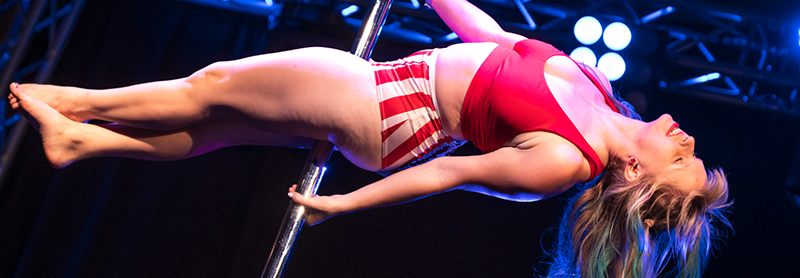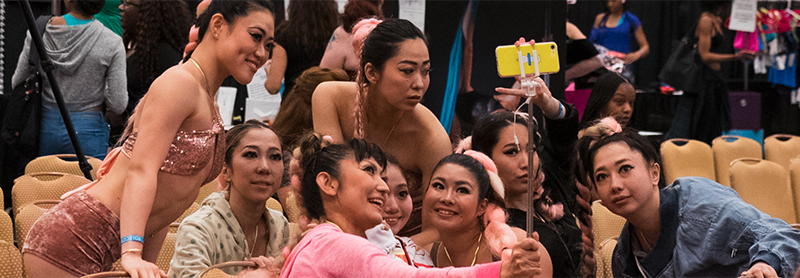Jumping back in time to the very first IPIA webinar (IPIA members can watch the…

How to find the best commercial space for your pole studio
There are many ways to start a pole studio. Some pole-preneurs choose virtual or mobile options or even teaching individuals or small groups out of their home as affordable ways to start a pole studio and then grow into a commercial or retail space. Other studio owners choose to locate their studio in a commercial space first.
The term “commercial space” is a generic phrase that defines any real estate property that is not residential and generally refers to a space that does not get or need a lot of foot traffic such as space in an office building on a floor higher than ground level. A “retail space” is also not a residential space and does depend on foot traffic, usually on the ground floor for a building. This term usually references spaces like stores or restaurants. A pole studio may locate in either type of space depending on the available space and the requirements of the studio owner for their business. For the purposes of this post, we’ll use the term commercial to represent either type of space.
Before committing to commercial lease make sure you have created a budget and made basic financial projections for your business. Your lease is often your most expensive business cost with labor costs (your teachers, front desk, etc.) a close second.
How to choose the right location for your pole studio
Research your target market and understand where people are most likely to take fitness or dance classes. Generally, people choose to go to a gym, dance or fitness studio near where they work or where they live.
Understand the legal requirements for your city, county or state for where different types of businesses can legally operate. Some areas specify zoning regulations that may not allow fitness-based businesses in certain areas. Also confirm how your business is categorized. Most studios, even the sexiest leaning studios, should be categorized as a fitness or dance studio/academy rather than a club to give the widest possible access to locations.
Once you have an idea of where you might want to locate your studio, physically go to that location and check out all fitness, dance and art-related businesses within a few miles. See what kind of traffic they get (by foot and by car) at different times of day. See how close and accessible public transit and/or parking options are to that area and if possible, stop into relevant retail and commercial businesses nearby to ask questions about the neighborhood and their experiences with safety, foot traffic, landlords, local law enforcement and any other information they are willing to share.
Whether to rent, sublet or buy your own space?
Generally, buying your own commercial space is not an option for most small business owners. If you are financially able to buy your own space, purchase one at an auction, inherit a space or otherwise acquire a space, then this is often the best long-term option. Your space now becomes an asset rather than a liability. You will be required to maintain your space and pay all relevant taxes and insurance, things that a landlord may do in a rental situation.
Renting your own location will give you the greatest control over how you build out the space and how you use the space. This is the most common option for most studio owners. Make sure you sign a contract and confirm you are able to legally operate your business in the space.
Subletting or renting a portion of another person’s commercial space may be an affordable option especially if you do not need total control over the space or do not intend to use it all the time. Before subletting a space from someone else, make sure you review their rental lease and confirm they are legally able to sublet to your business. You may even need to talk to their landlord to confirm. Have a separate sublet lease with the person on the main lease.
For any and all rental or purchase situations, make sure you have a contract.
How to find a commercial space
Finding a commercial space can be tricky. There are several online real estate properties searches just like buying a house such as LoopNet, CBRE and others. Listings are not always accurate and may not have information that is relevant to pole and aerial studios such as ceiling heights or types of ceilings. You would have to contact each location you’d like to visit and organize trips to see the space – make sure to bring a measuring tape to measure ceiling heights! You could also drive/walk around the area you intend to locate your business in and see if there are for lease/for rent signs and contact those places directly.
Some studio owners may choose to work with a leasing agent. A leasing agent, much like working with a real estate agent or realtor to buy a house, will help vet properties, take you on tours of properties, understands the legal requirements in your area and will help you negotiate a lease. Also similar to working with a real estate agent, they are typically paid a percentage commission that may be paid by you, the leasee or tenant, by the leasor or landlord, or paid by some combination of both parties. Generally, leasing agents are not paid until a contract is finalized.
What to look for in a commercial leasing contract
Commercial leasing contracts can be far more complex than signing a residential lease. Typical residential leases may include security deposits, pet deposits, potential coverage of homeowner association (HOA) dues (if relevant) and monthly rent. A commercial lease can be contractually as simple as a residential lease however most are not. A commercial lease term is often for more than a year so make sure you understand it before signing.
Types of leases:
- Gross: Landlord covers most costs, tenant pays a high rate
- Net Lease (Double, Triple): Tenant will pay for maintenance, insurance, taxes in addition to monthly rent. Lowers the rent but can increase liability. Take into account what condition the building is already in.
- Percentage Lease: Monthly rent and a percentage of your profit most common in retail.
Each type of lease has its pros and cons, and a professional leasing agent can help you navigate these details help to negotiate the best outcome on your behalf. Always make sure you have a contract. NEVER operate under a “handshake” even with people who you know well.
Many things can be detailed in a commercial leasing contract such as the cost to build out your studio. Maybe the space you want to rent was once a restaurant. Significant work would need to be done to that space to convert it to a pole studio. Consider establishing a relationship with a contractor who can come with you on commercial space tours and estimate the cost of building out a new space and making sure it is up to code such as how many bathrooms you would need, how big the bathrooms and doorways would need to be, etc.
For a pole studio, you may additionally want to include specific contract clauses such as how loud you can play music and until what time. You may also want to talk to your neighbors and confirm that they will be welcoming or at least not unwelcoming of having a pole studio as a neighbor before signing a multi-year lease. If you can, research the area your intended studio will be located in to understand if there will be changes to the area that would impact your business such as a big parking lot being turned into an office building or a major, local initiative to change the types of businesses on your street.
What are all of the other costs of having a commercial space?
Renting a commercial space is costly from a pure rent perspective, building out a commercial space to confirm it will work for your type of business is also costly. Confirm you understand the requirements for the studio/space you envision BEFORE even starting to look at spaces.
Ask yourself these questions:
- Do I have a relationship with a building contractor/handy person, or will I do all the work to build out the space or some of the work like installing flooring myself?
- How do I expect to use my space? Only pole classes or will I run parties or showcases as well. What considerations need to be taken into account.
- What size should my space be for the type of activities I intend to have? How far apart will the poles be? From each other and from the walls?
- Does the pricing I envision for my studio line up with number of people that can safely be in my space taking a class?
Generally, whatever estimates you make regarding the time and the money involved in physically building out your studio space—double it. Even with the best and most accurate plans, there are potentially many roadblocks that could impact your schedule and budget such as (but not exclusive to): weather delays, permit delays, unexpected additional repairs, contract delays, personal health issues, global pandemics and more.
Finding, renting (or buying) and then building out your pole studio can be an exciting time. Make sure you have created a business plan and worked on a budget before even starting to look at spaces in earnest. This is a big and expensive decision, stay as informed as possible every step of the way. Good luck!



